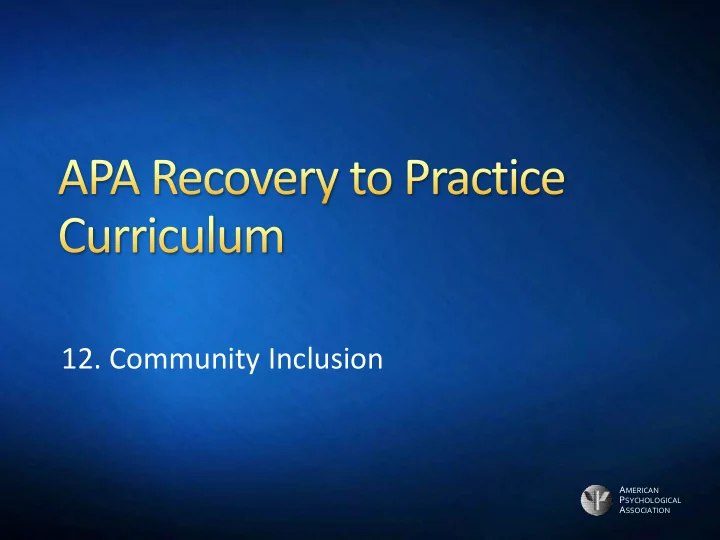

12. Community Inclusion A MERICAN P SYCHOLOGICAL A SSOCIATION
STIGMATISM REDUCES OPPORTUNITIES FOR COMMUNITY INCLUSION AND PARTICIPATION A MERICAN P SYCHOLOGICAL A SSOCIATION
People with Serious Mental Illnesses: Among the poorest and most vulnerable in society Consistently excluded from participation Often discriminated against – in a national study: 73% reported discrimination due to psychiatric disability 51% reported discrimination in employment 30% reported discrimination in housing (Corrigan, et al., 2003) Fear, misunderstanding and stigma are huge problems for people with serious mental illnesses A MERICAN P SYCHOLOGICAL A SSOCIATION
Intrinsic and Extrinsic Sources of Stigma Intrinsic Factors: • Odd behavior • Poor hygiene • Fear of rejection • Uncomfortable around others Extrinsic Factors: • Media that portrays people with serious mental illness as dangerous • Mental health system that encourages segregation and stigma • Community advocates for segregation • Community rules for acceptable behavior • General intolerance A MERICAN P SYCHOLOGICAL A SSOCIATION
Downward Spiral of Marginalization A MERICAN P SYCHOLOGICAL A SSOCIATION
Persons Most at Risk for Social Exclusion: Racial and ethnic minority groups People who are unemployed Those considered by the general public as undesirable: prostitutes, individuals who use alcohol or other drugs, etc. Immigrants and refugees People with physical and mental impairments People who are homeless A MERICAN P SYCHOLOGICAL A SSOCIATION
Culture and Gender – Important Considerations Etiology Gender/ and/or Trauma Language Ethnicity Religion Gender Accept- Adversities Capabilities Identity ability A MERICAN P SYCHOLOGICAL A SSOCIATION
Domains of Inclusion for Both General and Serious Mental Illness Populations Community Inclusion Implies Full Participation in Every Domain: • Leisure and recreational activities • Friendship and intimate relationships • Employment • Education • Housing • Religion and spiritual activities • Medical services, choices, and confidentiality • Protection of legal rights • Freedom from discrimination and granting of dignity • Right to free speech A MERICAN P SYCHOLOGICAL A SSOCIATION
The Ecological Framework Social inclusion shapes both the individual and the environment Individuals shape their own behavior to live within the social environment (culture) Environment is shaped by the interaction of individuals Sometimes people are excluded because those around them are afraid the person will fail or be hurt or humiliated, but: “ Many of our best achievements came the hard way: We took risks, fell flat, suffered, picked ourselves up, and tried again. Sometimes we made it and sometimes we did not. Even so, we were given the chance to try. Persons living with disabilities need these chances, too .” Perske, R. (1981). Hope For The Families – New Directions for Parents of Persons with Retardation and Other Disabilities A MERICAN P SYCHOLOGICAL A SSOCIATION
Ways the Mental Health System Can Help to Promote Inclusion: Ensure Environment Quality Reduce and eliminate environmental barriers Raise Self Esteem Encourage Social Encourage Emotional Participation Processing Eradicate Emotional Abuse Develop Self-Management Skills Diminish Emotional Negligence Reduce Stress Eradicate Emotional Abuse Make a broad-spectrum of individualized supports Reduce and eliminate readily available environmental barriers A MERICAN P SYCHOLOGICAL A SSOCIATION
Citation for this Module: American Psychological Association & Jansen, M. A. (2014). Community Inclusion. Reframing Psychology for the Emerging Health Care Environment: Recovery Curriculum for People with Serious Mental Illnesses and Behavioral Health Disorders. Washington, DC: American Psychological Association. www.apa.org/pi/rtp Citation for the full Curriculum: American Psychological Association & Jansen, M. A. (2014). Reframing Psychology for the Emerging Health Care Environment: Recovery Curriculum for People with Serious Mental Illnesses and Behavioral Health Disorders. Washington, DC: American Psychological Association. mjansen@bayviewbehavioral.org or jansenm@shaw.ca August, 2014 A MERICAN P SYCHOLOGICAL A SSOCIATION
Recommend
More recommend